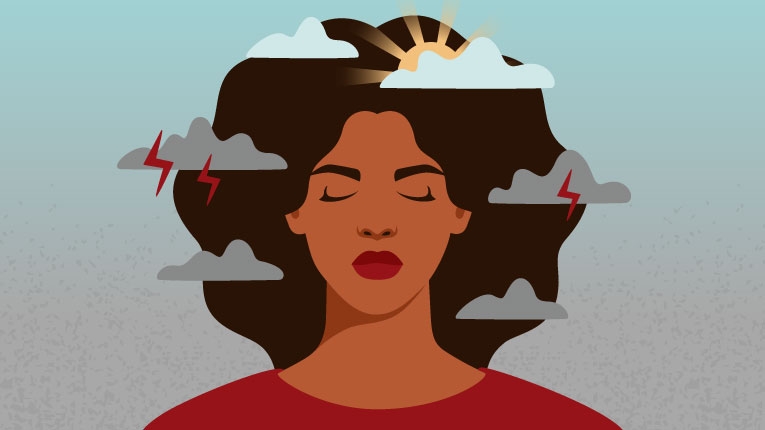What affects your credit scores?

Key Takeaways
Credit scores are affected by five factors: payment history, credit utilization, age of accounts, credit mix, and new credit.
Checking your own credit, comparing loan rates, and personal information like your address or income won’t affect scores.
Paying bills on time and keeping revolving credit balances low can help give your credit a boost.
Your credit scores are designed to predict how likely you are to repay a loan as agreed. These scores are calculated using information found in your credit reports—including payment history, length of credit history, outstanding debt, and more. Having higher credit scores can make it easier to qualify for a loan, credit card, or mortgage. In this article, we’ll take a look at what factors affect your credit scores the most.[1]
What factors make up your credit score?
Credit-scoring companies use software to analyze the information found in your credit reports. FICO® Score and VantageScore are the two main credit-scoring companies, with the Fair Isaac Corporation (FICO) Score being used by about 90% of top lenders.[1] [2] [3] [5]
Many other credit scores exist, so it’s important to note that a lender may base its decision on another score entirely.[1]
Scoring software programs use algorithms to review your credit history and financial habits. Scoring model calculations are a trade secret, but the factors that affect your FICO score and how they’re weighted are public knowledge.[1]
Below is a list of the factors that influence your FICO score and how each factor is weighted. The percentages reflect the importance of each factor. [2]
Payment history: 35%
Credit utilization: 30%
Length of credit history: 15%
Credit mix: 10%
New credit: 10%
VantageScore and other credit models may use slightly different criteria, but knowing how the FICO score works can help if you’re trying to improve your credit in general.[4]
These 5 factors impact your credit score the most
Understanding how your credit scores are determined can help you improve your credit over time. Here’s a closer look at what’s considered during the scoring process.
Payment history: 35%
Payment history is the most important factor affecting your credit scores because it helps predict whether you’ll fall behind on future bills. Even just one payment that’s 30 days late can cause your scores to dip. Foreclosure, bankruptcy, or an account sent to collections can have more serious consequences to your credit scores. [2]
Consistently making on-time payments can help keep your credit scores high. Missed payments can happen, but it’s important to get caught up on your bills as soon as possible. Over time, if you’re able to demonstrate a more positive payment history, your credit score will likely improve.
Credit utilization: 30%
Credit utilization is the amount you owe compared to your available credit. It’s calculated as a percentage and is the second most important factor in determining your credit scores. For example, if you have a $200 balance on a credit card with a $1,000 limit, then your utilization on that card is 20%. Credit-scoring models usually calculate utilization for each of your accounts separately as well as your total credit utilization across all accounts.[2]
People with credit utilization under 10% tend to have the highest credit scores, while utilization rates over 30% can negatively affect your credit scores. Try paying down credit cards with high balances to help improve your credit utilization and give your scores a boost. Then, stay on top of your balances to keep utilization as low as possible.
Length of credit history: 15%
Credit-scoring models also check how long each of your accounts has been open to evaluate your experience with managing debt. The age of your accounts carries less weight than other factors. In general, the longer your credit history, the higher your score is likely to be. The FICO score checks the age of your newest and oldest accounts, plus the average of all your accounts.[2]
The length of time you’ve had open credit cards and loans collectively make up your credit history. Keeping your credit cards open can help improve your credit history over time. (Keeping a loan account open for the long haul may technically help your credit. Open loans will elevate your DTI ratio and increase your interest costs, so it’s best to pay off any loans as soon as possible.)
You may close a credit card or loan because you paid off the debt or closed the account by choice. FICO can still use your closed accounts to calculate the age of your credit history. When you close an account in good standing, with no late payments, it often remains on your credit report for up to 10 years.[6]
Credit mix: 10%
Your credit mix, or the different types of accounts on your credit report, also helps determine your credit scores. While your credit mix isn’t nearly as important as your payment history or age of accounts, it can help show lenders that you can handle multiple types of debt. For instance, you may have taken out auto loans, student loans, mortgages, revolving credit such as credit cards, and installment loans like personal loans. People with high credit scores often have a mix of several different types of accounts.[2]
You may decide to open a new account to boost your credit scores. For instance, if you only have a student loan in your credit history, you may consider opening a retail credit card with a lower limit. Before opening any accounts, be sure you can afford to take on extra debt and make any payments on time.
Keep in mind that your credit mix is a relatively minor factor—so adding the new account might have a small impact on your scores.
New credit: 10%
A new credit account can help improve your credit mix and increase your total available credit. It’s important to be aware that each credit-scoring system may look at new credit differently. Applying for new accounts may ding your credit—especially if you apply for several cards in a short period.[2]
Credit-scoring models know that people often shop around for the best rates before taking out installment loans, such as mortgages. If you submit applications for installment loans in a short time frame, typically two weeks, the credit-scoring system usually counts all of the applications as one hard inquiry. This has less of an impact on your credit scores.
What doesn’t affect your credit score?
Payment history, credit utilization, age of accounts, type of accounts, and how often you apply for new credit all play a role in how your credit scores are calculated. Other factors won’t have an impact at all.[7]
Here’s a look at some pieces of information that aren’t factored into your FICO score:
Checking your own credit scores
Checking your own credit score regularly is a good way to keep tabs on your credit scores and look out for any unexpected or fraudulent information. You may also choose to check your score before applying for a credit card or loan. Checking your own credit score is considered a soft inquiry. Unlike hard inquiries, these won’t impact your credit.[7]
Checking your loan rates
With some creditors, like LendingClub Bank, checking your loan rate generates a soft credit inquiry, which won’t impact your scores. Just keep in mind a hard inquiry is likely when your loan is funded which could affect your credit score.[7]
Debt-to-income ratio
Debt-to-income (DTI) ratio, a comparison of your monthly income and bills, is often an important factor in lending decisions. A lower DTI ratio may help you get approved with more favorable loan offers because it means less of your income goes toward debt payments. Your DTI ratio doesn’t impact your credit score. However, having a lot of debt or maxing out your credit cards can negatively impact your credit scores.[7]
Your personal information
A credit report has a section that contains personal information such as your name, Social Security number, date of birth, current address, and previous addresses. This information helps verify your identity and doesn’t affect your credit scores.
Your credit reports won’t include demographic information like gender, ethnicity, race, religion, immigration status, political affiliations, or marital status. This information also won’t affect your credit scores.[7]
Your employer, income, and net worth
Your credit reports won’t include information about your income or net worth but may contain information about your current and previous employers. Lenders may consider your employment status and financial health when you apply for credit, but this information won’t affect your credit scores.[7]
Medical debt
As of 2023, credit reporting companies removed medical debt that’s less than a year old and all paid medical debt from credit reports. Steps are also being taken to remove medical debt under $500. If you find medical debt on your credit reports, you may be able to take action to have it removed.[8]
Do personal loans affect your credit scores?
A personal loan is a type of installment loan that can be used for almost any purpose, including debt consolidation or paying for a large expense like a wedding, vacation, or home repairs. Personal loans are generally unsecured, require no collateral to qualify, and are available at banks, credit unions, and online lenders.
Personal loans may impact your credit scores in a few different ways. Here are a few things to consider:
Credit inquiries: Checking your rate may only generate a soft credit inquiry on a person’s credit report, which is visible only to that person. A hard credit inquiry, which is visible to that person and others, and which may affect that person’s credit score, only appears on the person’s credit report if and when a loan is issued to the person. Credit eligibility is not guaranteed. Learn more about soft vs. hard credit inquiries.
Reported to credit bureaus: Making on-time loan payments can help boost your payment history and improve your credit scores, while late or missed payments have a negative effect.[9]
Adds to credit mix: Personal loans make a great addition to your credit mix, which can help raise your scores—even after the loan is closed (as long as you have a positive payment history).[2]
5 quick tips to improve your credit score
Once you understand what affects your credit, it can be easier to take action to improve your credit score and build long-lasting credit habits.
Pay your bills on time. Show you can manage credit by making your minimum monthly payment on time each month.[10]
Pay down revolving accounts. Tackle balances on revolving credit accounts, like credit cards, personal lines of credit, and home equity lines of credit (HELOCs), to help lower your credit utilization.[10]
Bring past-due accounts current. Pay off past-due balances or work with your lender to bring your account current.[10]
Limit how often you apply for new credit. Be selective when applying for new loans, credit cards, and other types of credit to avoid opening too much credit during a short amount of time.[10]
Don’t close unused credit card accounts. Keep credit cards open, even if you don’t use them often, to keep credit utilization low.[10]
The bottom line
Many factors affect your credit scores—and some more than others. But with careful attention to your finances, you can often improve your score over time. Keep in mind that payment history and credit utilization make up nearly two-thirds of your scores, so it’s important to pay your bills on time and keep balances low.[1][2]
Check your credit reports regularly to keep tabs on your scores and look for inaccuracies. You can request free copies of your credit reports from each of the three major credit bureaus—Equifax, Experian, and TransUnion—once a week at AnnualCreditReport.com.[10]
Consumer Financial Protection Bureau. “What is the difference between a credit report and a credit score?”
myFICO. “What's in my FICO Scores?”
myFICO. “FICO Score Remains the Most Widely Used Credit Score in the Securitization Market, Keeping Lender Confidence.”
VantageScore. “The Complete Guide to Your VantageScore.”
MyFICO
Experian. “When Are Closed Accounts Deleted?”
myFICO. “What's not in my FICO Scores.”
Consumer Financial Protection Bureau. “Have medical debt? Anything already paid or under $500 should no longer be on your credit report."
Consumer Financial Protection Bureau. “What is a personal installment loan?”
Consumer Financial Protection Bureau. “How do I get and keep a good credit score?”




